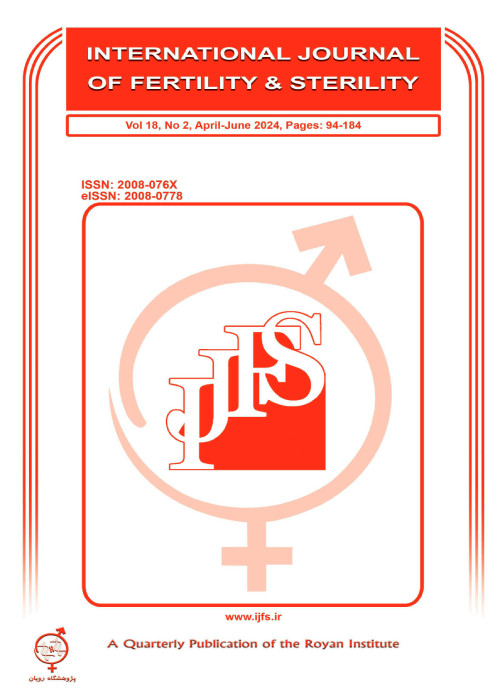Exploration of Infertile Couple's Support Requirements: A Qualitative Study
Author(s):
Abstract:
Background
Due to high prevalence of infertility, increasing demand for infertility treatment, and provision of high quality of fertility care, it is necessary for healthcare professionals to explore infertile couples’ expectations and needs. Identification of these needs can be a prerequisite to plan the effective supportive interventions. The current study was, therefore, conducted in an attempt to explore and to understand infertile couples’ experiences and needs. Materials And Methods
This is a qualitative study based on a content analysis approach. The participants included 26 infertile couples (17 men and 26 women) and 7 members of medical personnel (3 gynecologists and 4 midwives) as the key informants. The infertile couples were selected from patients attending public and private infertility treatment centers and private offices of infertility specialists in Isfahan and Rasht, Iran, during 2012-2013. They were selected through purposive sampling method with maximum variation. In-depth unstructured interviews and field notes were used for data gathering among infertile couples. The data from medical personnel was collected through semi-structured interviews. The interview data were analyzed using conventional content analysis method. Results
Data analysis revealed four main categories of infertile couples’ needs, including: i. Infertility and social support, ii. Infertility and financial support, iii. Infertility and spiritual support and iv. Infertility and informational support. The main theme of all these categories was assistance and support. Conclusion
The study showed that in addition to treatment and medical needs, infertile couples encounter various challenges in different emotional, psychosocial, communicative, cognitive, spiritual, and economic aspects that can affect various areas of their life and lead to new concerns, problems, and demands. Thus, addressing infertile couples’ needs and expectations alongside their medical treatments as well as provision of psychosocial services by development of patient-centered approaches and couple-based interventions can improve their quality of life and treatment results and also relieve their negative psychosocial consequences.Keywords:
Language:
English
Published:
International Journal Of Fertility and Sterility, Volume:9 Issue: 1, Apr-Jun 2015
Page:
81
magiran.com/p1388661
دانلود و مطالعه متن این مقاله با یکی از روشهای زیر امکان پذیر است:
اشتراک شخصی
با عضویت و پرداخت آنلاین حق اشتراک یکساله به مبلغ 1,390,000ريال میتوانید 70 عنوان مطلب دانلود کنید!
اشتراک سازمانی
به کتابخانه دانشگاه یا محل کار خود پیشنهاد کنید تا اشتراک سازمانی این پایگاه را برای دسترسی نامحدود همه کاربران به متن مطالب تهیه نمایند!
توجه!
- حق عضویت دریافتی صرف حمایت از نشریات عضو و نگهداری، تکمیل و توسعه مگیران میشود.
- پرداخت حق اشتراک و دانلود مقالات اجازه بازنشر آن در سایر رسانههای چاپی و دیجیتال را به کاربر نمیدهد.
In order to view content subscription is required
Personal subscription
Subscribe magiran.com for 70 € euros via PayPal and download 70 articles during a year.
Organization subscription
Please contact us to subscribe your university or library for unlimited access!


